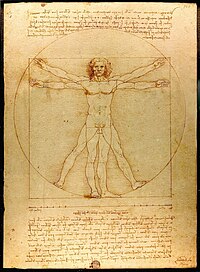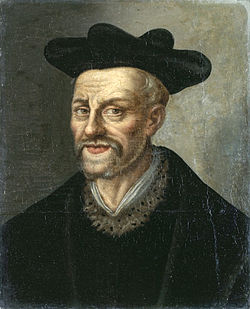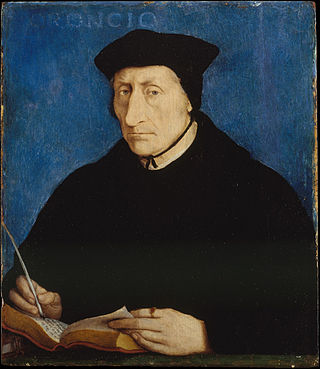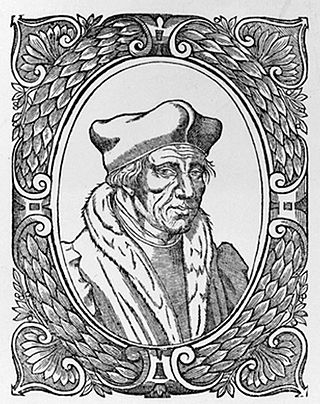| Part of a series on |
| Humanism |
|---|
 |
| Philosophy portal |

Humanism in France found its way from Italy, but did not become a distinct movement until the 16th century was well on its way.
| Part of a series on |
| Humanism |
|---|
 |
| Philosophy portal |

Humanism in France found its way from Italy, but did not become a distinct movement until the 16th century was well on its way.
On the completion of the Hundred Years' War between France and England, the intellectual currents of Renaissance humanism began to start. In 1464, Raoul Lefèvre composed for the Duke of Burgundy a history of Troy. At that time the French still regarded themselves as descendants of Hector. If we except the University of Paris, none of the French universities took part in the movement. Individual writers and printing-presses at Paris, Lyon, Rouen and other cities became its centres and sources. Guillaume Fichet and Robert Gaguin are usually looked upon as the first French Humanists. Fichet introduced "the eloquence of Rome" at Paris and set up a press at the Sorbonne. He corresponded with Bessarion and had in his library volumes of Petrarch, Guarino of Verona and other Italians. Gaguin copied and corrected Suetonius in 1468 and other Latin authors. Poggio Bracciolini's jest book and some of Valla's writings were translated into French. In the reign of Louis XI, who gloried in the title "the first Christian king", French poets celebrated his deeds. The homage of royalty took in part the place among the literary men of France that the cult of antiquity occupied in Italy.
Ancient Greek, which had been completely forgotten in France, had its first teachers in Gregory Tifernas, who reached Paris, 1458, Janus Lascaris, who returned with Charles VIII, and Hermonymus of Sparta, who had Johann Reuchlin and Guilielmus Budaeus (known variously as William Budaeus (English), Guillaume Budé (French) and Guilielmus Budaeus (Latin)) among his scholars. An impetus was given to the new studies by the Italian, Hieronymus Aleander, afterwards famous for his association with Martin Luther at Worms. He lectured in Paris, 1509, on Plato and issued a Latino-Greek lexicon. In 1512 his pupil, Vatable, published the Greek grammar of Manuel Chrysoloras. Budaeus, perhaps the foremost Greek scholar of his day, founded the Collège Royal, 1530, and finally induced Francis I to provide for instruction in Biblical Hebrew and Greek. The University of Paris at the close of the 14th century was sunk into a low condition and Erasmus bitterly complained of the food, the morals and the intellectual standards of the Collège de Montaigu which he attended. Budaeus urged the combination of the study of the Scriptures with the study of the classics and exclaimed of the Gospel of John, "What is it, if not the almost perfect sanctuary of the truth!"
Jacques Lefèvre d'Étaples studied at the Universities of Paris, Pavia, Padua and Cologne and, for longer or shorter periods, tarried in the greater Italian cities. He knew Greek and some Hebrew. From 1492 to 1506 he was engaged in editing the works of Aristotle and Raymundus Lullus and then, under the protection of Guillaume Briçonnet, Bishop of Meaux, he turned his attention to theology. It was his purpose to offset the Sentences of Peter the Lombard by a system of theology giving only what the Scriptures teach. In 1509, he published the Psalterum quintuplex, a combination of five Latin versions of the Psalms, including a revision and a commentary by his own hand. In 1512, he issued a revised Latin translation of the Pauline Epistles with commentary. In this work, he asserted the authority of the Bible and the doctrine of justification by faith, without appreciating, however, the far-reaching significance of the latter opinion. Three years after the appearance of Luther's New Testament, Lefèvre's French translation appeared, 1523. It was made from the Vulgate, as was his translation of the Old Testament, 1528. In 1522 and 1525, appeared his commentaries on the four Gospels and the Catholic Epistles. The former was put on the Index by the Sorbonne. The opposition to the free spirit of inquiry and to the Reformation, which the Sorbonne stirred up and French royalty adopted, forced him to flee to Strassburg and then to the liberal court of Marguerite de Navarre.
Among those who came into contact with Lefèvre were Guillaume Farel and John Calvin, the Reformers of Geneva. Another student of Lefèvre was the anatomist Jacques Dubois. In the meantime Clément Marot, 1495–1544, the first true poet of the French literary revival, was composing his French versification of the Psalms and of Ovid's Metamorphoses . The Psalms were sung for pleasure by French princes and later for worship in Geneva and by the Huguenots. When Calvin studied the humanities and law at Bourges, Orléans and Paris, about 1520, he had for teachers Maturin Cordier and Pierre de L'Estoile, the canonists, and Melchior Wolmar, teacher of Greek, whose names the future Reformer records with gratitude and respect.

Rodolphus Agricola was a Dutch humanist of the Northern Low Countries, famous for his knowledge of Latin and Greek. He was an educator, musician, builder of church organs, a poet in Latin and the vernacular, a diplomat, a boxer and a Hebrew scholar towards the end of his life. Today, he is best known as the author of De inventione dialectica, the father of Northern European humanism and as a zealous anti-scholastic in the late fifteenth century.
Robert I Estienne, known as Robertus Stephanus in Latin and sometimes referred to as Robert Stephens, was a 16th-century printer in Paris. He was the proprietor of the Estienne print shop after the death of his father Henri Estienne, the founder of the Estienne printing firm. Estienne published and republished many classical texts as well as Greek and Latin translations of the Bible. Known as "Printer to the King" in Latin, Hebrew, and Greek, Estienne's most prominent work was the Thesaurus linguae latinae which is considered to be the foundation of modern Latin lexicography. Additionally, he was the first to print the New Testament divided into standard numbered verses.

François Rabelais was a French Renaissance writer, physician, Renaissance humanist, monk and Greek scholar. He is primarily known as a writer of satire, of the grotesque, and of bawdy jokes and songs.

John Colet was an English Catholic priest and educational pioneer.

Guillaume Budé was a French scholar and humanist. He was involved in the founding of Collegium Trilingue, which later became the Collège de France.

Étienne Dolet was a French scholar, translator and printer. Dolet was a controversial figure throughout his lifetime. His early attacks upon the Inquisition, the city council and other authorities in Toulouse, together with his later publications in Lyon treating of theological subjects, roused the French Inquisition to monitor his activities closely. After being imprisoned several times, he was eventually convicted of heresy, strangled and burned with his books due to the combined efforts of the parlement of Paris, the Inquisition, and the theological faculty of the Sorbonne.

Jacques Lefèvre d'Étaples was a French theologian and a leading figure in French humanism. He was a precursor of the Protestant movement in France. The "d'Étaples" was not part of his name as such, but used to distinguish him from Jacques Lefèvre of Deventer, a less significant contemporary who was a friend and correspondent of Erasmus. Both are also sometimes called by the German version of their name, Jacob/Jakob Faber. He himself had a sometimes tense relationship with Erasmus, whose work on Biblical translation and in theology closely paralleled his own.

Christian humanism regards humanist principles like universal human dignity, individual freedom, and the importance of happiness as essential and principal or even exclusive components of the teachings of Jesus. Proponents of the term trace the concept to the Renaissance or patristic period, linking their beliefs to the scholarly movement also called 'humanism'.

Guillaume Fichet was a French scholar, who cooperated with Johann Heynlin to establish the first printing press in France (Paris) in 1470.
George Hermonymus, also known as Hermonymus of Sparta, was a 15th-century Greek scribe, diplomat, scholar and lecturer. He was the first person to teach Greek at the Collège de Sorbonne in Paris.
Henri Estienne also known as Henricus Stephanus, was a 16th-century Parisian printer. Born in Paris in 1460 or 1470, he is the son of Geoffroy d'Estienne and Laure de Montolivet. His brother Raimond d'Estienne became the heir of the Estienne family, while Henri was disinherited by his father in 1482 "for having devoted himself to printing", the profession of printer then being the cause of losing your title. Estienne established the Estienne printing firm in 1502 from his wife's deceased husband's Higman Press. After his death in 1520, his wife married his colleague Simon de Colines who took control of the Estienne Press until his son Robert Estienne assumed control of the press in 1526.

The migration waves of Byzantine Greek scholars and émigrés in the period following the end of the Byzantine Empire in 1453 is considered by many scholars key to the revival of Greek studies that led to the development of the Renaissance humanism and science. These émigrés brought to Western Europe the relatively well-preserved remnants and accumulated knowledge of their own (Greek) civilization, which had mostly not survived the Early Middle Ages in the West. The Encyclopædia Britannica claims: "Many modern scholars also agree that the exodus of Greeks to Italy as a result of this event marked the end of the Middle Ages and the beginning of the Renaissance", although few scholars date the start of the Italian Renaissance this late.

Robert Gaguin was a noted French Renaissance humanist and philosopher; he was minister general of the Trinitarian Order.
François Vatable was a French humanist scholar, a hellenist and hebraist.
Bible translations into French date back to the Medieval era. After a number of French Bible translations in the Middle Ages, the first printed translation of the Bible into French was the work of the French theologian Jacques Lefèvre d'Étaples in 1530 in Antwerp. This was substantially revised and improved in 1535 by Pierre Robert Olivétan. This Bible, in turn, became the basis of the first French Catholic Bible, published at Leuven in 1550, the work of Nicholas de Leuze and François de Larben. Finally, the Bible de Port-Royal, prepared by Antoine Lemaistre and his brother Louis Isaac Lemaistre, finished in 1695, achieved broad acceptance among both Catholics and Protestants. Jean-Frédéric Ostervald's version (1744) also enjoyed widespread popularity.

The French Reformer John Calvin (1509–1564) was a theological writer who produced many sermons, biblical commentaries, letters, theological treatises, and other works. Although nearly all of Calvin's adult life was spent in Geneva, his publications spread his ideas of a properly reformed church to many parts of Europe and from there to the rest of the world. It is especially on account of his voluminous publications that he exerts such a lasting influence over Christianity and Western history.

Simon de Colines was a Parisian printer and one of the first printers of the French Renaissance. He was active in Paris as a printer and worked exclusively for the University of Paris from 1520 to 1546. In addition to his work as a printer, Colines worked as an editor, publisher, and punchcutter. Over the course of his lifetime, he published over 700 separate editions. Colines used elegant roman and italic types and a Greek type, with accents, that were superior to their predecessors. These are now called French old-style, a style that remained popular for over 200 years and revived in the early 20th century. He used rabbits, satyrs, and philosophers as his pressmark.
Guillaume Cop, born in Basel in the 1460s, died in Paris on 2 December 1532, was a Renaissance physician and humanist.

Vettor Fausto or Vittore Fausto (1490–1546) was Venetian Renaissance humanist and naval architect. He was an expert in Greek and the classics. He worked as a copyist and a soldier in his youth. His studies led him to propose the construction of a quinquereme, a galley with five rowers per bench. He published original poetry in Greek, had a hand in the publication of the Complutensian Polyglot Bible and edited classical texts for publication, most notably the Aristotelis Mechanica, which he translated into Latin. In his later years he grew disillusioned with Venetian politics, even being accused of treason.